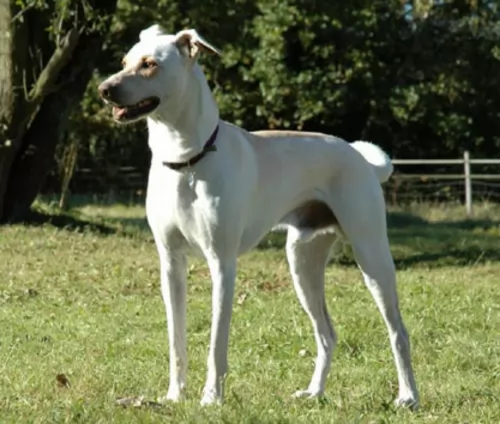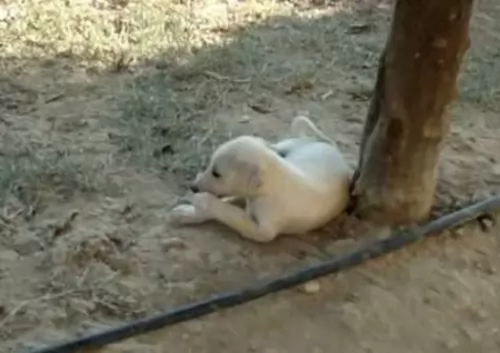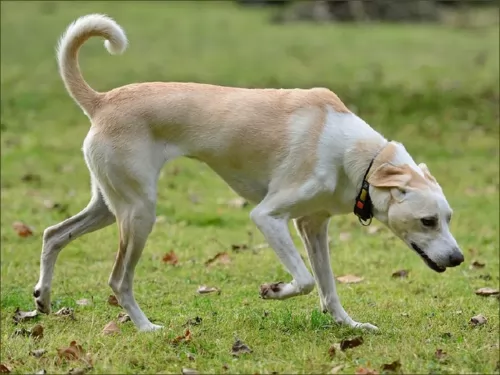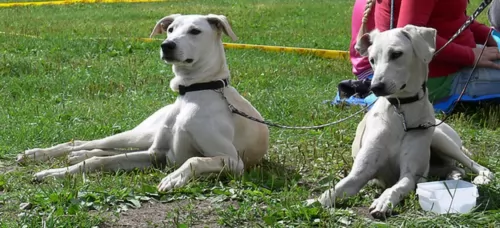 Petzlover
Petzlover Cretan Hound is originated from Greece but Pomeranian is originated from Germany. Cretan Hound may grow 40 cm / 16 inches higher than Pomeranian. Cretan Hound may weigh 26 kg / 58 pounds more than Pomeranian. Both Cretan Hound and Pomeranian has almost same life span. Both Cretan Hound and Pomeranian has almost same litter size. Both Cretan Hound and Pomeranian requires Moderate Maintenance.
Cretan Hound is originated from Greece but Pomeranian is originated from Germany. Cretan Hound may grow 40 cm / 16 inches higher than Pomeranian. Cretan Hound may weigh 26 kg / 58 pounds more than Pomeranian. Both Cretan Hound and Pomeranian has almost same life span. Both Cretan Hound and Pomeranian has almost same litter size. Both Cretan Hound and Pomeranian requires Moderate Maintenance.
 Although the Cretan Hound or the Kritikos Lagonikos is recognized in both Greece and Germany, the hunting dog breed is from the island of Crete, Greece. The dog’s history goes back thousands of years. It is an ancient breed and some believe it is one of the oldest hunting breeds in Europe.
Although the Cretan Hound or the Kritikos Lagonikos is recognized in both Greece and Germany, the hunting dog breed is from the island of Crete, Greece. The dog’s history goes back thousands of years. It is an ancient breed and some believe it is one of the oldest hunting breeds in Europe.
The Cretan Hound has been bred as a working dog, combining sight and scent to track down their prey. Today it is still a rare dog breed that you won’t easily find outside of Crete.
Greece kennels recognize this dog as well as some European kennels, but it isn’t recognized by the American Kennel Club.
 Pomeranian dog Known as the Pom and classified as a toy dog breed, the Pomeranian comes from the Spitz dog from the Arctic regions. It is thought that the dog is descended from larger Spitz-type dogs, and more specifically the German Spitz.
Pomeranian dog Known as the Pom and classified as a toy dog breed, the Pomeranian comes from the Spitz dog from the Arctic regions. It is thought that the dog is descended from larger Spitz-type dogs, and more specifically the German Spitz.
It appears to be an ancient dog breed because there are recordings of its existence from 1764 already. This little dog is thought to have got his name from the area known as Pomeranian in Northern Poland as well as along the Baltic Sea, Germany.
The first breed club for this dog was established in England in 1891. Not long afterwards the first breed standard was written. In the standard published in 1998, The Pomeranian Dog is categorized in the German Spitz standard.
 Known for its extraordinary scent abilities as well as its speed, this dog has always been used as a hare hunter because of these skills.
Known for its extraordinary scent abilities as well as its speed, this dog has always been used as a hare hunter because of these skills.
It’s a slender dog of medium to large size and stands at about 60-68cm in height and weighs between 20 – 30kg. It is lean, strong, muscular and swift with a body that is inclined to be longer than tall.
He is slightly heavier than other scenthounds and his ribs aren’t seen. The head is wedge-shaped and the ears drop down, are folded back or can be semi-erect. The eyes are dark and the tail is long and curves upwards with longer hair being found on the tail.
The coat is short and smooth, and coat colors of the dog are varied and can be fawn, sandy, grey, white, black or brindle, and it can be tri-colored too.
The Cretan Hound is alert to sight, sound and scent and when it senses prey, the tail moves in a circular way and the dog becomes rigid for a while before he is off on the hunt.
He is a gentle, intelligent dog, reserved around strangers but making an excellent family pet as he gets on well with all his human family members as well as pets in the house. With good training and socialization, the dog becomes more relaxed around strangers.
He isn’t an aggressive dog, and while he is alert to sounds and smells, he doesn’t make a particularly good watchdog.
 This is such a sweet little dog, full of good cheer and with such a bright little face. He weighs between 1.5kg and 4kg and stands at anything between 17 and 28cm in height.
This is such a sweet little dog, full of good cheer and with such a bright little face. He weighs between 1.5kg and 4kg and stands at anything between 17 and 28cm in height.
He is such a compact little fluff ball with sharp erect ears and a fox like appearance with a well feathered tail that curls up over the dog’s back.
The coat is thick and spritely, not lying flat but standing up around the dog. Coats can be nearly any color, but the most common is tan, reddish, orange or you get a mix of cream tan and black.
When you look into the bright little face of the Pomeranian Puppy, you can see that he is a true extrovert. He is social and has a huge personality. They’re bright, eager, feisty, loving and loyal.
Full of fun and very intelligent, they may be small and cute, but training and socialization will do him the world of good as it means you can take him anywhere with you and he’ll be well behaved. They grow attached to their owners and want to protect them.
They can be somewhat aloof with strangers and its this wariness around them that makes them good watchdogs. They get on well with children in the home and are prepared to make friends with other pets in the family too.
 The Cretan Hound is an energetic, curious dog, but when it comes to being a family pet, he is affectionate and gentle.
The Cretan Hound is an energetic, curious dog, but when it comes to being a family pet, he is affectionate and gentle.
He is a reserved dog around strangers. He likes to be busy and will love his walks and games with his human family members. He is smart so is readily trained and he likes to be obedient and to please.
The Cretan Hound will live in harmony with other dogs in the home and they’re also patient and good around disciplined children who have learned to respect animals.
Provide your Cretan Hound with his fair share of love and attention and he will go out of his way to be a loyal and loving family friend.
 Pomeranians are such bright, friendly little dogs and they’re also active. These loving dogs are also intelligent so you can easily teach him some simple commands such as sit or lie down.
Pomeranians are such bright, friendly little dogs and they’re also active. These loving dogs are also intelligent so you can easily teach him some simple commands such as sit or lie down.
He won’t want to lie down for too long though because he’s full of beans.
He’s alert too so he makes a good watchdog. When you bring one of these dogs into your home as a pet and companion animal, you won’t be disappointed as he’s got a whole lot of love to give.
 The Cretan Hound is a healthy, robust dog breed, but even so, he can suffer from some common health problems that other dogs are also susceptible to. Some of these are hip dysplasia , cancer, ear infections, bloat and cherry eye.
The Cretan Hound is a healthy, robust dog breed, but even so, he can suffer from some common health problems that other dogs are also susceptible to. Some of these are hip dysplasia , cancer, ear infections, bloat and cherry eye.
Remember that if you don’t want your dog to have puppies, they can actually benefit health-wise from being spayed or neutered. Doing this for your pet can prevent a number of health issues later on down the line.
Make sure too, that your puppy receives his vaccinations in a timely fashion so as to avoid terrible, life threatening illnesses such as parvo and rabies.
 Your little Pomeranian Puppy is a sturdy dog who isn’t going to battle too much with health issues. With good care such as good food and exercise, the Pomeranian can reach 12 – 16 years of age.
Your little Pomeranian Puppy is a sturdy dog who isn’t going to battle too much with health issues. With good care such as good food and exercise, the Pomeranian can reach 12 – 16 years of age.
Some of the most common health issues you might come across
This problem comes about when the ridges which form the patella groove in the knee aren’t deep enough to allow the patella to sit securely. This causes the patella to move out of the groove. While the muscles are contracted, the patella isn’t able to return to the correct position.
Pomeranians Dogs are prone to quite a few eye problems such as tear duct problems and cataracts. As a responsible dog owner, take your pet to the vet if you suspect eye problems.
The trachea carries air to the lungs and it can collapse. Your dog will have a chronic, dry cough and this can be brought about when people tug on their dog's leash.
Every little dog battles with teeth and gum problems which can lead to early tooth loss. When you brush your Pomeranian, make a point of checking inside his mouth too, as a bad tooth can cause pain but also all kinds of health problems.
 You’re certainly not going to have to do too much grooming with the Cretan Hound as he is a low maintenance breed.
You’re certainly not going to have to do too much grooming with the Cretan Hound as he is a low maintenance breed.
The dog is a short haired breed and an average shedder, so a good brush twice a week will keep the coat free of loose hairs and maintain the condition of the hair.
As with all dogs, the nails as well as the ears must be checked and attended to. The veterinarian can advise you on how to keep his ears clean and free of infection, as prodding around without knowing can damage his ears.
This Cretan Hound has high activity needs. He is energetic and also hard-working, and you’ll need to be taking him on long walks and providing him with some highly energetic playing sessions. Throw ball for him and take him with you when you go jogging or cycling.
 Pomeranians Dogs have a thick, double coat, so you will need to invest in a decent brush so that you can brush him. He is a shedder so this is an important part of grooming. Some people prefer to take the dog to the groomers and have the coat professionally cut.
Pomeranians Dogs have a thick, double coat, so you will need to invest in a decent brush so that you can brush him. He is a shedder so this is an important part of grooming. Some people prefer to take the dog to the groomers and have the coat professionally cut.
Your cute little Pomeranian isn't the kind of dog to spend too much time asleep on the couch. He is energetic and full of beans and he will wait anxiously for you to take down his leash and take him on a walk. In indoors his bright little face will be watching yours to see if there’s any chance of a ball game.
People never know if they should feed their dogs dry kibble, semi-moist or canned dog food. Homemade food is always good, but if you opt to also use commercially manufactured dog food, go for the good quality ones that have vitamins and minerals in them.
Every dog needs a good balance of protein, carbs, minerals, fats, vitamins and trace elements. People often get all worked up over feeding their pets when it can be so simple.
Use a high quality dry kibble, but now and then add some home-made cooked food into it as a treat – about once or twice a week. Boil some chicken, brown rice, sweet potato, carrots and spinach and add this in to the dry kibble.
Every now and then a little bit of raw meat will also do your pet the world of good. What could be more simple than this? Nutritious, tasty and healthy, and your pet will thrive on it.
Make sure he always has a bowl of fresh, cool water close by.